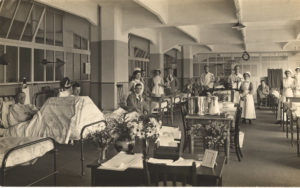An ongoing dialogue on HIV/AIDS, infectious diseases,
August 27th, 2017
Who’s Most Likely to Leave an Out-of-Office Message While on Service?
 Once upon a time, I used being on service as a convenient excuse for not writing very much — or certainly, not writing very much of importance — on this site.
Once upon a time, I used being on service as a convenient excuse for not writing very much — or certainly, not writing very much of importance — on this site.
The on-service time also allowed me to poke gentle fun at my colleagues, several of whom always turn on an “out-of-office” message when they attend on the inpatient ID consultation service.
I’m talking about this thing that responds instantly when you email them:
I am currently attending on the inpatient consult service. During this busy time, I may not be able to respond to email in a timely fashion. If you need to reach me urgently, please page me by calling xxx-xxx-xxxx, or leave a non-urgent message here and I will respond shortly.
Thank you,
Rudolph
Reminding me of this post, my friend Carlos Del Rio sent me this email earlier this year:
Going on service April 1st. Should I put my “Rudolph” message up?
I’d advised Carlos to check Emory’s Policies and Procedures — am sure it’s in there somewhere.
Now, having just completed a couple of weeks doing inpatient ID consults — and falling behind on emails — I thought it time to add a few additional observations about this practice:
- Who is most likely to do it? Let’s call people who do this “OOODS.” (Pronounced like the first syllable of “noodle,” and standing for “out-of-office during service” types.) My anecdotal impression is that OOODS are predominantly academic physicians, people who know patient care is important but don’t do it on a day-to-day basis. Hence they want to “clear the decks” of other pressing responsibilities. A minority might be full-time outpatient clinicians who only rarely do inpatient work.
- When not on service, they are generally very responsive to email. OOODS are often “inbox zero” types who wouldn’t think of allowing the sun to set on a critical research or administrative query. So when busy consult days happen, and the long hours on the wards make it impossible for them to keep up, they want to reassure their colleagues and friends that they haven’t suddenly decided to abandon academic medicine for more frivolous activities. Imagine the speculation!
“Hey, I emailed Dr. Smith 12 hours ago, and he hasn’t gotten back to me yet — that’s weird, he’s usually so quick to respond. Plus, no out-office-message.”
“Yes, that’s weird. But he’s a pretty big Phish Phan — maybe seeing all their summer concerts?”
- They’re generally pretty important. Many exceptions to this rule, but the academic rank and productivity of OOODS is impressive. One study found that the number of citations for papers published by OOODS was significantly higher than non-OOODS, even when controlling for total RVUs generated on the consult service. NIH grant dollars and the impact factor of their published papers were also significantly higher. If you don’t believe me, the published paper can be found here.
- One person who inspired the original post identified herself almost immediately. Shortly after I wrote it, I received this email:
Hey, I’m Rudolph aren’t I??? Is that a bad thing?
First, let the record show that this OOODS person who emailed me was only one of several people who sent me a similar query, as I adapted the sample out-of-office message from a bunch of different ones used by friends and colleagues.
Second, it is by no means a bad thing — it’s just a thing some people choose to do; others don’t (I don’t) — as evidenced by the fact that this particular OOODS person was most deservedly just appointed an extremely important leadership position.
Congratulations, Rochelle!


Have never really understood why people do this.
Now I understand a bit more, thanks!